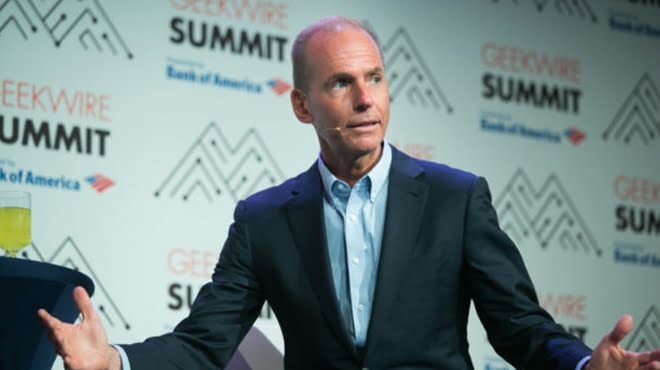Autonomous flying cars have always seemed like a futuristic innovation that belongs more on the silver screen than in real life, but Boeing is making rapid headway on the concept and its top executive says we could see the first operational self-driving airborne vehicles take to the skies in under five years.
Speaking at the GeekWire Summit, Boeing CEO Dennis Muilenburg laid out the company’s vision for flying cars, as well as the importance of safety measures for the concept. Muilenburg said the company is already building prototypes and expects them to fly within the year.
“Imagine a future city that has three-dimensional highways, with flying taxis, flying cars,” Muilenburg said. “That future is not that far away. In fact we are building the prototype vehicles today. We are also investing in the ecosystem that will allow that to operate safely and reliably as it must.”
The full vision of self-flying cars ferrying people through busy urban areas will take longer than five years to realize, Muilenburg said, but vehicles that start with more simple functions like cargo aren’t far away.
The ecosystem to manage this new method of travel includes enhanced air traffic control. Earlier this year, Boeing teamed up with Austin-based SparkCognition to develop artificial intelligence and blockchain technologies for tracking and directing flying cars through traffic corridors.
Muilenburg wouldn’t say where these futuristic vessels would be tested, though he did say that the environment would be a “similar case” to Airbus’ Vahana flying-taxi testing ground in Pendleton, Ore. Testing self-flying cars requires dedicated airspace and a slate of approvals from the Federal Aviation Administration.
Last month, Boeing announced that the development of autonomous air vehicles would be the focus of a new research center to be opened in Cambridge, Mass., staffed by engineers from its subsidiary Aurora Flight Sciences and other Boeing teams. Even before its acquisition, Aurora was developing an electric-powered, vertical-takeoff-and-landing craft for Uber’s planned air taxi service.
Whether it takes, three, five, 10 years or more for self-driving cars to hum above city streets and highways, it’s clear that Boeing and many other aerospace companies are all-in on the concept.
“That work is underway; this is a transformation that is going to happen faster than many of us might have thought a couple years ago, and we are on the leading edge,” Muilenburg said.
Source:
GeekWire
